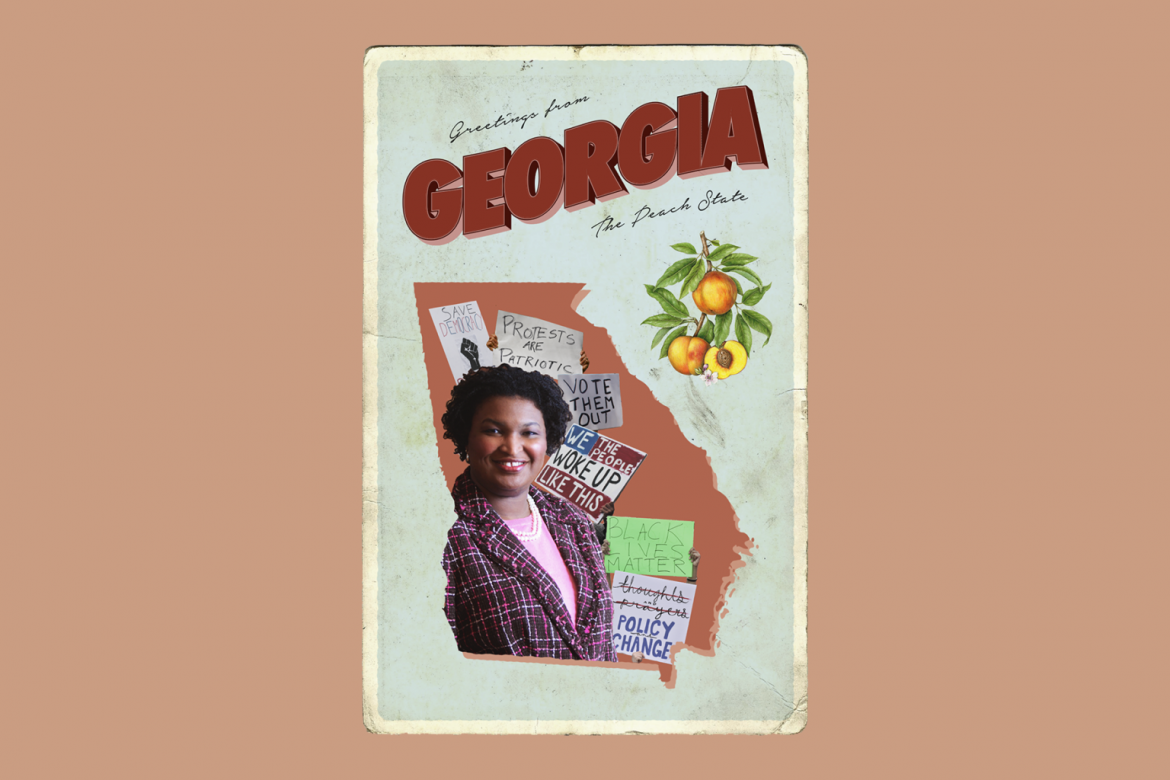Georgia Democratic gubernatorial candidate Stacey Abrams, formerly the Georgia House of Representatives Democratic minority leader, is featured on a “Welcome to Georgia” postcard, surrounded by protest signs that read messages such as “Black Lives Matter.” Abrams is a candidate who, if elected, would actualize the change sought by these protestors, a change which is necessary and urgent. Graphic by Katie Grace Upchurch
The Georgia gubernatorial election has become a microcosm of the U.S. political climate, and a perfect example for why more people of color and women are needed in office.
According to a 2017 American Civil Liberties Union poll, 91 percent of Americans say that the criminal justice system has problems that need fixing.
If this many Americans — who come from across the political spectrum — believe that a change is needed, then why is nothing happening?
Because the politicians in office don’t represent the people they were elected to serve.
Currently, of America’s 50 governors, only six are women — a staggering number that does not match up with the fact that women are 51 percent of the U.S. population. Even worse, 47 of the 50 governors are white, while white people only make up 62 percent of the U.S. population.
The Georgia gubernatorial race has become a microcosm of our terrifying national sociopolitical climate, demonstrating the alienation of the sides of the political spectrum, the now-typical and accepted extremism of the right and the dire need for new politicians in office.
On the Republican side, there is Georgia Secretary of State Brian Kemp who was aptly labeled the “Enemy of Democracy” in an August editorial from The New York Times. Kemp’s campaign ads went viral for their extremity, leaving many thinking, “Wow, SNL really nailed it with this skit,” as they seem to be a ridiculous parody of what the political right has become.
I interviewed Kemp on Aug. 28 and among his unsubstantiated claims, one stood out to me.
“You guys live in Athens, you know about the gang violence we have in the city,” he told me. “We need to have a governor who’s gonna take on public safety reform and go after criminal street gangs, criminal illegals and Mexican drug cartels and others who are wreaking havoc in our neighborhoods.”
It is the spreading of erroneous and hateful rhetoric like this that normalizes extremist views and creates a culture of bigotry.
On the other side of the gubernatorial election is democratic candidate Stacey Abrams, the former Georgia House of Representatives Democratic minority leader. Abrams is a Black woman running on a platform that ranges from fostering an effective and engaged government to criminal justice reform.
If Abrams were to be elected on Nov. 8, she would become the first Black female governor.
Ever.
Politicians like Abrams, politicians of color and woman politicians, who are running on campaigns to protect and represent unprotected and underrepresented communities are the ones who will bring real change.
Abrams is a candidate who truly represents the people she would be elected to serve and is a candidate who would bring a more open, honest and productive culture with her. Abrams isn’t appealing to extremism or hate and bigotry, she is simply running on a platform aimed at giving all Georgians the “freedom and opportunity to thrive.”
While Kemp is busy tearing down immigrants, Abrams is standing for compassionate and inclusive — what should be common sense and humane — positions.
A vote for Abrams is a vote for increased access to health care, environmental justice, and the creation of new jobs.
A vote for Abrams is a vote against bigotry, hate and violence.
A vote for Abrams is a vote for the common good.
More from Katie Grace Upchurch
